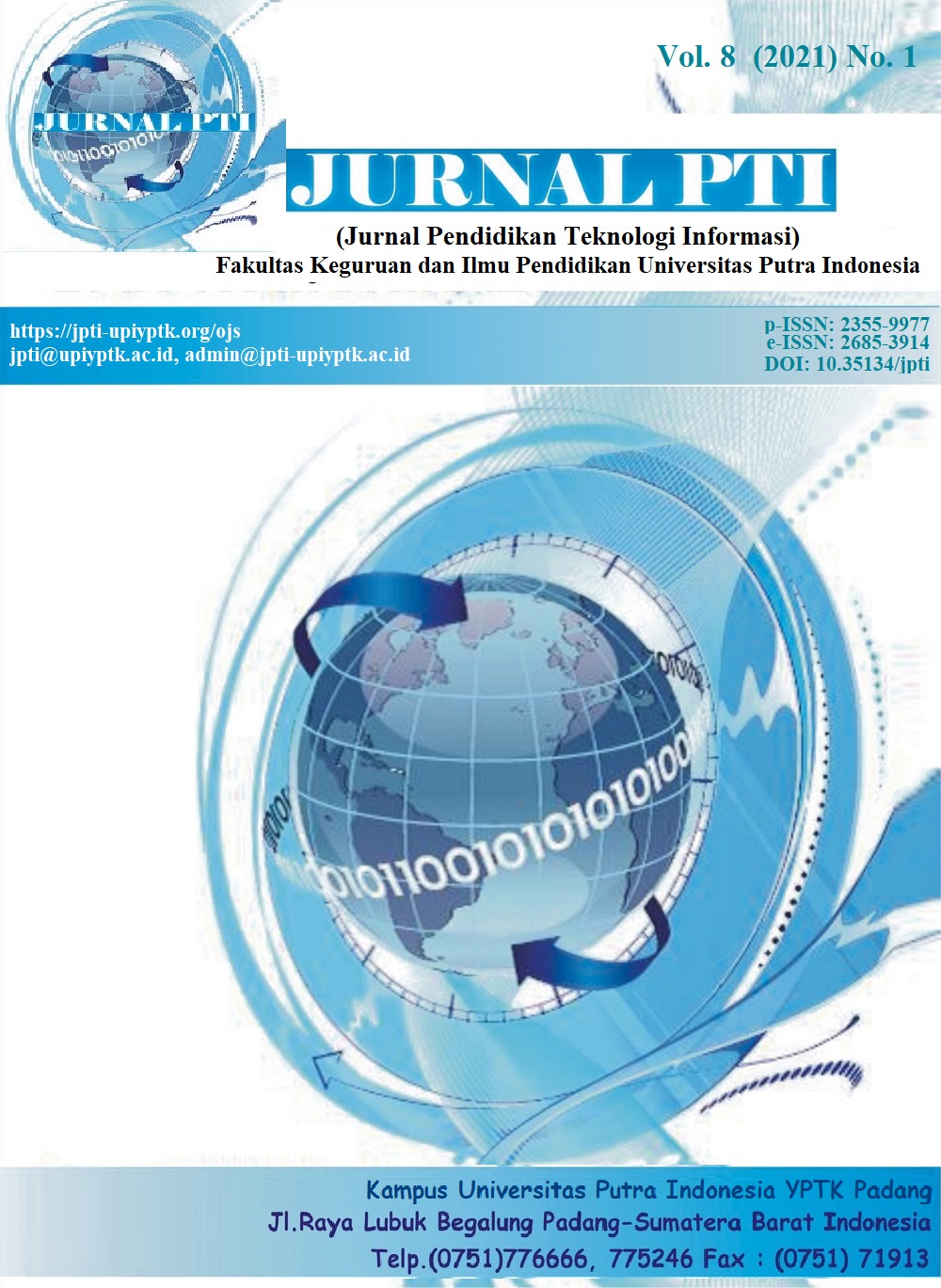Level Up Your Learning: Gamification as an Effective Strategy to Increase Student Engagement in Algorithm Classes
DOI:
https://doi.org/10.35134/jpti.v12i2.251Keywords:
Gamifikasi, Keterlibatan Mahasiswa, Algoritma, Pendidikan Tinggi, Kuasi-eksperimenAbstract
Student engagement is a crucial factor for learning success, particularly in the Algorithm course, which requires abstract thinking, problem-solving, and persistence. This study aimed to compare student engagement between gamified learning and traditional methods through a quasi-experimental design involving two groups: the experimental class (n = 36) applying gamification and the control class (n = 36) receiving conventional instruction. A student engagement questionnaire covering behavioral, emotional, and cognitive dimensions was employed, supported by classroom observations and Learning Management System logs. The findings revealed that both groups had similar pre-test scores (3.12 and 3.09), but at post-test the experimental class improved significantly to 4.21, while the control class only reached 3.34. Dimension analysis showed the experimental group outperforming the control in behavioral engagement (4.35 vs. 3.41), emotional engagement (4.18 vs. 3.29), and cognitive engagement (4.09 vs. 3.32), with a large effect size (d = 0.85). Student perceptions also highlighted leaderboards (78%) and step-based missions (70%) as the most effective gamification elements, followed by achievement badges (65%). In conclusion, this study demonstrates that well-designed gamification aligned with students’ needs can serve as a more effective pedagogical strategy than traditional methods in enhancing student engagement in the Algorithm course
References
M. Li, S. Ma, and Y. Shi, “Examining the effectiveness of gamification as a tool promoting teaching and learning in educational settings: a meta-analysis,” Frontiers in Psychology, vol. 14, 1253549, 2023. https://doi.org/10.3389/fpsyg.2023.1253549.
Z. Zhan, et al., “The effectiveness of gamification in programming education: Evidence from a meta-analysis,” Computers & Education: Artificial Intelligence, vol. 3, p. 100096, 2022. https://doi.org/10.1016/j.caeai.2022.100096.
Glover, J., & Johnson, T. (2024). Adaptive Gamification in Higher Education: Integrating Learning Analytics to Enhance Engagement. *Journal of Interactive Learning Research, 35*(2), 145–162.
J. Swacha and J. Szydłowska, “Does Gamification Make a Difference in Programming Education? Evaluating FGPE-Supported Learning Outcomes,” Education Sciences, vol. 13, no. 10, p. 984, 2023. https://doi.org/10.3390/educsci13100984.
M. R. Cuhanazriansyah, D. Cahyaningrum, T. Hendrawan, and M. Nafi, “Implementasi Game Based Learning (GBL) Monopoli Digital (MonDig) dalam Pembelajaran Mahasiswa IKIP PGRI Bojonegoro,” Jurnal Riset dan Teknologi Informasi (JRTI), vol. 4, no. 2, pp. 89–98, 2023.
E. R. Kahu, “Framing student engagement in higher education,” Studies in Higher Education, vol. 38, no. 5, pp. 758–773, 2013. https://doi.org/10.1080/03075079.2011.598505.
R. M. Ryan and E. L. Deci, “Self-Determination Theory and the Facilitation of Intrinsic Motivation, Social Development, and Well-Being,” American Psychologist, vol. 55, no. 1, pp. 68–78, 2000. https://doi.org/10.1037/0003-066X.55.1.68.
R. N. Landers, “Developing a Theory of Gamified Learning: Linking Serious Games and Gamification of Learning,” Simulation & Gaming, vol. 45, no. 6, pp. 752–768, 2014. https://doi.org/10.1177/1046878114563660.
Sailer, M., & Homner, L. (2024). Gamification enhances student intrinsic motivation, perceptions of autonomy and relatedness, but minimal impact on competency: A meta-analysis and systematic review. *Educational Technology Research and Development, 72*(1), 45–68.
Yang, Y., Asaad, Y., & Dwivedi, Y. K. (2023). Enhancing intrinsic learning motivation through gamification: A self-determination theory perspective. *International Journal of Information and Learning Technology, 40*(2), 173–188.
Zhang, L., Chen, Q., & Li, F. (2025). Collaborative Gamification for Higher Education: The Role of Team Missions in Student Motivation. *International Journal of Educational Technology in Higher Education, 22*(4), 178–193
Hidayat, A., & Fadhilah, R. (2024). Gamifikasi Kontekstual: Integrasi Budaya Lokal dalam Pembelajaran Digital di Perguruan Tinggi. *Jurnal Teknologi Pendidikan Nusantara, 5*(1), 11–25.
Patel, S., & Nguyen, H. (2024). Measuring Student Engagement through Digital Trace Data in Gamified Learning Environments. *Computers & Education, 208*, 105986.
Baah, I. Govender, and P. R. Subramaniam, “Enhancing Learning Engagement: A Study on Gamification’s Influence on Motivation and Cognitive Load,” Education Sciences, vol. 14, no. 10, p. 1115, 2024. https://doi.org/10.3390/educsci14101115.
Liu, L., Margoni, F., He, Y., & Liu, H. (2021). Neural substrates of the interplay between cognitive load and emotional involvement in bilingual decision making. Neuropsychologia. https://doi.org/10.1016/j.neuropsychologia.2020.107721
Jones, C. M., & Noël, B. (2022). Skin in the game -Erroneous beliefs and emotional involvement as correlates of athletes’ sports betting behavior and problems. Journal of Behavioral Addictions. https://doi.org/10.1556/2006.2021.00034
Daher, W. (2020). Students’ positioning and emotions in learning geometric definition. In Journal on Mathematics Education. https://doi.org/10.22342/jme.11.1.9057.111-134
Almeida, C., Kalinowski, M., Uchôa, A., & Feijó, B. (2023). Negative effects of gamification in education software: Systematic mapping and practitioner perceptions. Information and Software Technology, 156(April). https://doi.org/10.1016/j.infsof.2022.1071 42
Nagata, G. A., & Panduwinata, L. F. (2025). Pengaruh Pembelajaran dengan Metode Gamifikasi Berbantuan Baamboozle Untuk Meningkatkan Engagement dan Hasil Belajar Siswa Kelas XI Manajemen Perkantoran di SMKS Ketintang Surabaya. Jurnal Ilmiah Profesi Pendidikan, 10(3), 2143-2150.
Downloads
Published
How to Cite
Issue
Section
License
Copyright (c) 2025 JURNAL PTI (PENDIDIKAN DAN TEKNOLOGI INFORMASI) FAKULTAS KEGURUAN ILMU PENDIDIKAN UNIVERSITA PUTRA INDONESIA "YPTK" PADANG

This work is licensed under a Creative Commons Attribution 4.0 International License.





